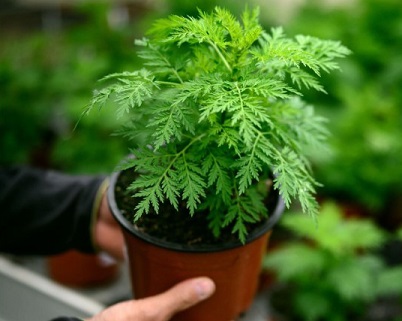Nikhil Prasad Fact checked by:Thailand Medical News Team Jun 25, 2024 10 months, 1 day, 22 hours, 26 minutes ago
Herbs And Phytochemicals: As the world continues to battle the COVID-19 pandemic, researchers are constantly seeking new ways to combat the virus. One promising avenue of exploration is the use of traditional medicinal plants. A recent
Herbs And Phytochemicals study by scientists from Sefako Makgatho Health Sciences University-South Africa, Rhodes University-South Africa and University of Tadulako-Indonesia has identified bioactive compounds from South African plants that may inhibit the SARS-CoV-2 virus, which causes COVID-19. This discovery could pave the way for new, accessible treatments, especially in regions where advanced medical resources are scarce.
 Herbs And Phytochemicals: South African Plants Could Help Fight COVID-19
Herbs And Phytochemicals: South African Plants Could Help Fight COVID-19
Thailand
Medical News had previously covered studies that also showed that Artemisia could help with COVID-19.
https://www.thailandmedical.news/news/must-read-covid-19-treatment-calls-for-research-into-sod-3,-artemisia-annua-and-ashwagandha-as-possible-adjuvant-drugs-for-covid-19
https://www.thailandmedical.news/news/breaking-news-artemisia-annua-german-researchers-confirm-that-extracts-of-the-plant-artemisia-annua-are-active-against-sars-cov-2-coronavirus
https://www.thailandmedical.news/news/covid-19-herbs-american-in-vitro-study-shows-that-herb-extract-of-artemisia-annua-inhibits-sars-cov-2-replication
https://www.thailandmedical.news/news/herbs-and-phytochemicals-artemisia-derived-nanovesicles-mitigates-lung-tissue-damage-caused-by-sars-cov-2-and-flu-viruses
The Importance of Medicinal Plants
Medicinal plants have been used for centuries to treat various ailments. They are a rich source of bioactive compounds that can have therapeutic effects. In recent years, there has been a growing interest in exploring these natural resources for potential new drugs. The COVID-19 pandemic has accelerated this interest as scientists search for effective treatments and preventive measures against the virus.
South African Medicinal Plants Under the Microscope
The study focused on two South African medicinal plants: Artemisia annua and Artemisia afra. These plants have a long histor
y of use in traditional medicine for treating various ailments, including respiratory infections and fevers. Researchers believe that compounds from these plants could potentially interfere with the virus’s ability to infect human cells.
Artemisia annua, commonly known as sweet wormwood or sweet annie, is native to Asia but is now cultivated worldwide. It is well-known for its role in producing artemisinin, a compound used in malaria treatment.
Artemisia afra, also known as African wormwood, is native to southern Africa and is used traditionally to treat a variety of illnesses, including coughs, colds, and malaria.
How the Study Was Conducted
The researchers used advanced techniques to identify and analyze the compounds found in these plants. They employed methods such as ultra-high-performance liquid chromatography-tandem mass spectrometry (UPLC-MS/MS) to profile the chemical composition of the plant extracts.
The primary focus was on how these compounds could inhibit the binding of the SARS-CoV-2 spike protein to the angiotensin-converting enzyme 2 (ACE2) receptor, which is the virus’s entry point into human cells. By blocking this interaction, the virus would be unable to enter and infect cells, effectively preventing the infection from taking hold.
Key Findings
-Non-Toxic Compounds: The study found that the extracts from both plants were non-toxic to human cells at lower concentrations. This is crucial as it means the compounds can be used safely in potential treatments.
-Chemical Profiling: A total of 81 bioactive compounds were identified. Among these, three compounds showed the most promise: 6''-O-acetylglycitin, 25-hydroxyvitamin D3-26,23-lactone, and sesaminol glucoside.
-Molecular Docking Studies: These studies revealed that the three compounds had strong binding affinities to the SARS-CoV-2 spike protein. This means they could effectively block the virus from attaching to the ACE2 receptor on human cells.
-In Vitro Inhibition Assay: In laboratory tests, all three compounds demonstrated the ability to inhibit the interaction between the virus’s spike protein and the ACE2 receptor. Sesaminol glucoside was identified as the most effective inhibitor.
Potential Implications
This discovery is significant as it opens up the possibility of developing new, plant-based treatments for COVID-19. The identified compounds could be further developed into medications that help prevent or treat infections by blocking the virus’s entry into human cells.
The use of plant-based treatments also offers advantages in terms of accessibility and cost. Medicinal plants are often readily available and can be cultivated locally, making them a potentially affordable option for many communities, especially in developing countries.
Challenges and Future Research
While these findings are promising, further research is needed to fully understand the potential of these compounds. Clinical trials will be essential to determine their efficacy and safety in humans. Additionally, more studies are needed to explore the full range of bioactive compounds in these and other medicinal plants.
Researchers will also need to investigate the best methods for extracting and purifying these compounds on a larger scale. This will involve optimizing extraction processes and ensuring that the active compounds are produced consistently and in sufficient quantities for therapeutic use.
Conclusion
The identification of these bioactive compounds from South African medicinal plants marks an exciting development in the fight against COVID-19. It highlights the potential of traditional medicine and natural compounds in addressing modern health challenges. As research progresses, these findings could lead to new, effective treatments that are accessible and affordable, particularly in regions where medical resources are limited.
By continuing to explore the natural world for solutions, scientists are uncovering new ways to combat the virus and protect public health. This study not only contributes to our understanding of COVID-19 but also underscores the value of biodiversity and traditional knowledge in modern medicine.
Thailand Medical News would like to however warn that one drawback of this study was that the vitro studies dis not test the efficacy of these plant extracts against the various SARS-CoV-2 variants especially the newer KP and LB variants. With the various mutations found on the newer sub-lineages since the advent of the Omicron, we are very doubtful that these plants would be efficient as anti-virals.
For further reading, the full study can be accessed at the peer-reviewed journal: Pharmaceuticals.
https://www.mdpi.com/1424-8247/17/7/821
For the latest on
Herbs And Phytochemicals, keep on logging to Thailand Medical News.
Read Also:
https://www.thailandmedical.news/news/herbs-and-phytochemicals-artesunate-a-new-guardian-for-organ-and-tissue-health
https://www.thailandmedical.news/news/herbs-and-phytochemicals-emodin-derivatives-as-potential-weapons-against-sars-cov-2
